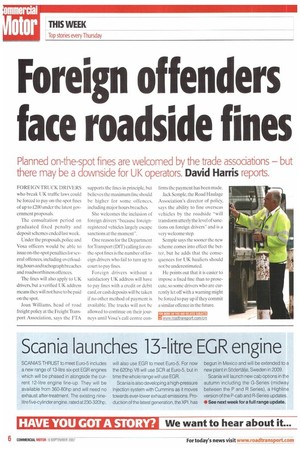Foreign offenders face roadside fines
Page 6

If you've noticed an error in this article please click here to report it so we can fix it.
Planned on-the-spot fines are welcomed by the trade associations — but there may be a downside for UK operators. David Harris reports.
FOREIGN TRUCK DRIVERS who break UK traffic laws could be forced to pay on-the-spot fines of up to £200 under the latest government proposals.
The consultation period on graduated fixed penalty and deposit schemes ended last week.
Under the proposals, police and Vosa officers would be able to issue on-the-spot penalties for several offences, including overloading,hours and tachograph breaches and roadworthiness offences.
The fines will also apply to UK drivers, but a verified UK address means they will not have to be paid on the spot.
Joan Williams, head of road freight policy at the Freight Transport Association, says the FTA supports the fines in principle, but believes the maximum fine should be higher for some offences, including major hours breaches.
She welcomes the inclusion of foreign drivers "because foreignregistered vehicles largely escape sanctions at the moment".
One reason for the Department for Tra nsport (DfT) calling for onthe-spot fines is the number of foreign drivers who fail to turn up to court to pay fines.
Foreign drivers without a satisfactory UK address will have to pay fines with a credit or debit card, or cash deposits will he taken if no other method of payment is available. The trucks will not be allowed to continue on their journeys until Vosa's call centre con firms the payment has been made.
Jack Semple. the Road Haulage Association's director of policy, says the ability to fine overseas vehicles by the roadside "will transform utterly the level of sanctions on foreign drivers" and is a very welcome step.
Semple says the sooner the new scheme comes into effect the better, but he adds that the consequences for UK hauliers should not be underestimated.
He points out that it is easier to impose a fixed fine than to prosecute, so some drivers who are currently let off with a warning might be forced to pay up if they commit a similar offence in the future.
FOR MORE ON THIS AND RELATED SUBJECTS
www.roadtransciort.com/crn
































































































































































































